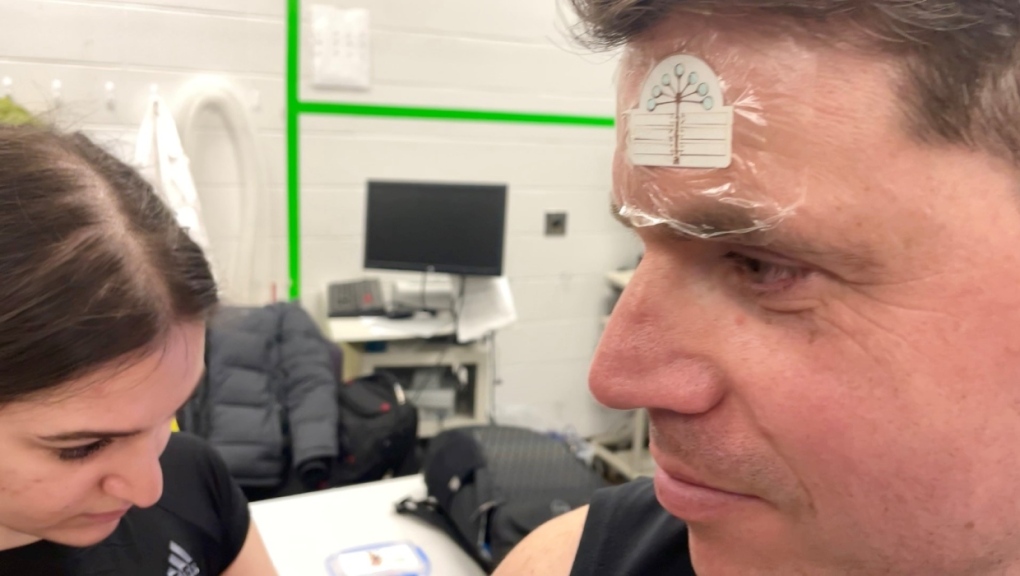Monitoring stress levels from your sweat? Calgary team tests out sensor
Researchers at the University of Calgary are testing out a wearable patch that can determine how stressed you are from your sweat.
The patch measures how much cortisol is in your sweat, as the hormone is a key biomarker of stress.
"With stress, you'll typically have an increased heart rate, you can increase your sweating, your blood vessels will constrict, you get the release of cortisol – which really prepares you for the fight or flight response," said David Rosenegger, the CEO of SenseSi Technology Inc.
"One of the problems is, when people have elevated cortisol for long periods of time, then they can reduce that level of healing that they would need to recuperate from something like a concussion."
Rosenegger says a wearable patch is a non-invasive way to collect cortisol samples so people can immediately see their stress levels.
"A lot of the tests that do cortisol research are usually blood-based tests and expensive," he said. "We're looking for an easier way to really test these cortisol levels that can be done quickly and cheaply."
While the human body produces sweat all over, Amir Sanati-Nezhad, an associate professor in the department of biomedical engineering and the main principal investigator with the project, says researchers are focusing on collecting it from the forehead for now.
"So we are looking for (many) biomarkers that indicate (things like) dehydration, disease, fibrosis condition, skin cancer and even some infectious diseases," he said. "So at some point we can eliminate the blood testing and really rely on the sweat detection."
 David Rosenegger wears a patch to collect his sweat that will allow researchers to measure the cortisol in it and determine his stress level. Sanati-Nezhad says the sensor technology can also be used for diabetic patients who monitor their levels from blood samples taken from a pin-pricked finger.
David Rosenegger wears a patch to collect his sweat that will allow researchers to measure the cortisol in it and determine his stress level. Sanati-Nezhad says the sensor technology can also be used for diabetic patients who monitor their levels from blood samples taken from a pin-pricked finger.
He says the technology used to collect data with the wearable patch could one day be incorporated into a smart watch that can already monitor many things like your heart rate.
"All the components are coming together in terms of sensor devices and technology, then clinical trials are coming to validate," said Sanati-Nezhad. "Probably a couple of more years, but that is exactly what we are looking for, to see these biomolecules detected with smartwatches."
And it's not just humans the researchers are looking at for monitoring stress levels.
Amin Komeili, associate professor at the Schulich School of Engineering, says horses play a big role Alberta at the race track, Calgary Stampede and on ranches.
"I'm surprised when I realized that there are one million horses in Canada contributing $19 billion into Canadian economy," he said. "So what we want to do is to modify our technology and take the stress in animals."
Komeili says currently one of the challenges to monitoring stress levels in horses is that they have to be transported to a veterinarian who will take blood samples looking for cortisol. However, that entire process is stressful for the animal.
"This technology allows us to attach sensor … And we can measure stress on a larger scale, non-invasively. without any animal handling."
CTVNews.ca Top Stories

Can the Governor General do what Pierre Poilievre is asking? This expert says no
A historically difficult week for Prime Minister Justin Trudeau and his Liberal government ended with a renewed push from Conservative Leader Pierre Poilievre to topple this government – this time in the form a letter to the Governor General.
'I'm still thinking pinch me': lost puppy reunited with family after five years
After almost five years of searching and never giving up hope, the Tuffin family received the best Christmas gift they could have hoped for: being reunited with their long-lost puppy.
Wrongfully convicted N.B. man has mixed feelings since exoneration
Robert Mailman, 76, was exonerated on Jan. 4 of a 1983 murder for which he and his friend Walter Gillespie served lengthy prison terms.
Pickup truck driver killed by police after driving through Texas mall and injuring 5
A pickup truck driver fleeing police careened through the doors of a JCPenney store in Texas and continued through a busy mall, injuring five people before he was fatally shot by officers, authorities said.
Unifor members ratify new agreement with Canadian National Railway
Unifor said on Sunday that its members at Canadian National Railway (CN Rail) have ratified a new four-year collective agreement, averting a potential strike action.
6 adults, 4 children taken to hospital following suspected carbon monoxide exposure in Vanier
The Ottawa Police Service says ten people were taken to hospital, with one of them in life-threatening condition, after being exposed to suspected carbon monoxide in the neighbourhood of Vanier on Sunday morning.
Two U.S. Navy pilots shot down over Red Sea in apparent 'friendly fire' incident, U.S. military says
Two U.S. Navy pilots were shot down Sunday over the Red Sea in an apparent 'friendly fire' incident, the U.S military said, marking the most serious incident to threaten troops in over a year of America targeting Yemen's Houthi rebels.
Big splash: Halifax mermaid waves goodbye after 16 years
Halifax's Raina the Mermaid is closing her business after 16 years in the Maritimes.
Second body recovered from site of B.C. landslide
The second resident of a home that was destroyed by a landslide in Lions Bay, B.C., last weekend was found dead Saturday, officials confirmed.































